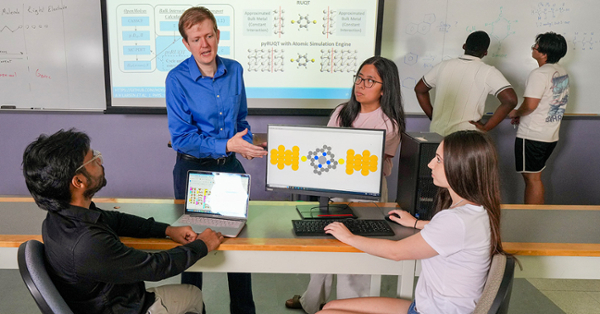NSF funds quantum research at Rowan University
NSF funds quantum research at Rowan University

Quantum science and engineering research across the United States recently received a $39 million boost from the U.S. National Science Foundation (NSF), including a new three-year, $800,000 project led by Rowan University’s Erik Hoy, Ph.D.
Hoy, an associate professor of chemistry and biochemistry in the College of Science & Mathematics, will lead efforts to develop fundamental design principles for molecular qubit quantum sensors. Qubits, or quantum bits, are a basic unit of information, as small as an electron or photon. Such sensors are incredibly tiny indicators of subtle changes within an environment.
The Rowan team aims to improve the sensitivity and response of optical and electrical sensors, which can be used in applications ranging from materials to biology.
Today’s quantum research builds on discoveries made during the early 20th century about the behavior of atomic and subatomic particles, revolutionary work that led to devices such as the laser and transistor.
“We’re living in the second quantum revolution in science,” said Hoy, who also earned the NSF’s Faculty Early Career Development Program (CAREER) Award this year. “The work underway now will one day introduce a new generation of novel electric and magnetic field sensors of unparalleled sensitivity.”
The NSF announced 23 research awards to institutions across the country through its Expanding Capacity in Quantum Information Science and Engineering (ExpandQISE) program. The funding directly supports research, training and educational activities through partnerships between established QISE programs at research-intensive institutions and up-and-coming programs at institutions seeking to build their quantum research and development infrastructure.
“Maintaining our country's global leadership in quantum information science demands that we engage the full spectrum of talent that’s waiting to be unleashed from each and every U.S. community,” says NSF Director Sethuraman Panchanathan. “The NSF ExpandQISE program is simultaneously strengthening the quantum workforce and investing in the scientific and technological advances that will be the foundation for a quantum-enabled future.”
NSF developed the ExpandQISE program in support of priorities outlined in the 2018 National Quantum Initiative Act, enacted to accelerate quantum research and development for the long-term economic and national security of the U.S. ExpandQISE aims to accelerate quantum-focused research by reducing barriers to participation and increasing the diversity and breadth of U.S. institutions doing that research.
Rowan will work with its community college partners and the University of Chicago to further extend the field of quantum science. The project will develop a graduate student exchange program that will send Rowan doctoral students to the University of Chicago for training and research. Outreach to South Jersey community colleges will introduce more students to the field and create new opportunities for training the future quantum workforce.
This award is co-funded by the Advancing Informal STEM Learning program.